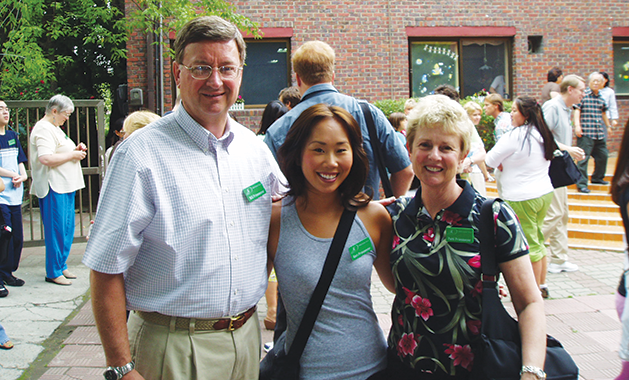
The van must have carried a thick scent of trepidation and uncertainty, mixed with the smell of fried octopus, which a trio of interpreters, seated in the van’s rear seats, popped into their mouths like buttery popcorn. The van also carried Kara Priesmeyer Riedesel, then 23, and her parents, William and Patti Priesmeyer. The group was traveling to Wonju, South Korea, a city about 140 kilometers east of Seoul, to meet a woman who, they hoped, was Riedesel’s birth mother.
On May 23, 1982, a little girl named Il, Sun, Woo was born in South Korea. Three months later, she’d land in Minnesota with a double ear infection, meet her adoptive parents, and spend her first night in the hospital in a strange country. Her name would become Kara Elizabeth Priesmeyer. She’d grow up in Deephaven, be joined by an adopted brother, Jeff, attend Minnetonka schools, graduate from the University of St. Thomas with a degree in journalism and mass communication, and receive a master’s degree in clinical counseling and psychotherapy from Adler Graduate School. She would also marry and become a mom.
After graduate school at Adler, Riedesel opened Life Insights Post Adoption & Attachment Center, now in Excelsior, where she counsels children and families who are navigating the sometimes rough seas of post-adoption life. “The minute I opened my doors, I was surprised by the demand of the number of people who needed services and couldn’t find any,” she says. (Riedesel also counsels adolescent girls, and children and adolescents affected by divorce or separation.)
“Many parents come to me asking, ‘Why are my children so angry?’ ” Riedesel, now 35, says, noting that, from birth to about age 5, children’s worlds are defined by their families. Entering school changes things, especially for adoptees. “Why don’t you look like your mom?” or “Is that your real brother?” are just a couple of queries from classmates that can sting a tender heart. By second and third grade, children start to see the flip side of their parents’ versions of events. Moms and dads often say with love, “We traveled around the world to find you,” or “We fought so hard to get you.” Older kids might counter with “If you loved me so much, why didn’t my birth parents?” says Riedesel. “Now that’s where the anger starts.”
Riedesel offers clients coping and healing tools. “Adoptees are über-aware of their [emotional] surroundings,” she says—waiting for the shoe to drop (for example, waiting for a best friend to abandon them for a different pal). They’re also constantly watching for nonverbal cues from the people around them. Children are great observers but terrible interpreters,” Riedesel says. But not all her clients are children. Adults who were adopted as children also seek guidance when confusing emotions bubble up, once they enter committed relationships or have children of their own, for example. “They’re scared,” she says.
Riedesel’s impetus to counsel adoptive families is not difficult to understand. There have been moments in her life when she struggled with her dual identities—American and Korean—and grappled with feelings of loss and grief, which many adoptees experience in not fully knowing the first chapter of their lives. But it might have been that journey back to South Korea as a young woman that fully ignited her desire to pursue her career.
“My family and I entered into a life-altering experience for two weeks, and I know now that I will never be the same again,” Riedesel writes in her blog about the trip. The journey to Seoul, a college graduation gift from her parents, had a dual purpose: so she could visit her birth country and possibly meet her birth mother. (Representatives of Children’s Home Society of Minnesota organized the trip for several other adoptees and aided in the search for birth parents.)
Prior to the trip, in acknowledgement of Korean customs, Riedesel and her mother filled a suitcase with gifts—just in case she’d meet her birth mother and other relatives. A necklace with a heart within a heart was chosen for her birth mother.
With no initial word on her birth mother’s identity, Riedesel and her parents progressed through the trip’s itinerary, which included a visit to an orphanage. As she stood looking at too many babies in too-small quarters, Riedesel couldn’t help but picture herself there during the first three months of her life, a period about which she knew almost nothing. “You see yourself in all of it. This may have been me,” she says of the orphanage. “We all sobbed.”
The group also visited a home for birth mothers, where Riedesel took a peek into what might have been her birth mother’s life. The women were scared and anxious to meet the American adoptees. They wanted to know that babies who grow up in the United States can turn out happy and healthy. “It was really deep,” Riedesel writes. “The orphanages and the birth mother homes were beyond anything I could have ever wrapped my head around. Not only was it inspiring and heartbreaking, but for the first time, I was able to see what my own journey must have looked like.”
At breakfast one morning, midway through the trip, Riedesel was told that the agency had possibly found her birth mother or someone who knew her. The woman wanted to meet Riedesel. After the two-hour van ride, Riedesel saw a woman standing at the train station. “She looked like me,” she recalls. The group gathered for two hours in a nearby tea shop. The woman continued to assert, through interpreters, “I’m not her mother. I may know her. I want to give her blessings.” Though reticent to confirm that she was the birth mother, the woman did reveal that she had delivered a son at the same time and in the hospital where Riedesel was born, leading the group to suspect she delivered twins. “I always felt I had another part of me,” Riedesel says. Patti Priesmeyer showed the woman a photo album of Riedesel’s earlier years, hoping to spark a reaction. “I know the look of a mother looking at [pictures] of her baby,” Riedesel recalls Patti saying, and that look crossed the woman’s face.
Despite not receiving a definitive answer from the woman, Riedesel gave her the necklace. “I felt as though, even if she wasn’t my birth mother, that she was close to her, and I wanted someone close to my birth mother, if not her, to have it,” she says.
In the end, Riedesel departed South Korea without confirmation. “I never got it. It was very hard,” she says, but she bears no ill will toward anyone, least of all her birth mother. “She was so scared. [Her family] probably didn’t know that she had me. Her entire being rests on not being shamed.” The stain of shame would have marked Riedesel, as well. “I wanted her to see I was OK,” she says. After taking photographs with the woman and reflecting on the visit, Riedesel made her own emotional progress. “I’ve given it closure on my own,” she says.
“When I returned home, I knew that somehow I had been given the opportunity to see and experience all that I had for a reason,” Riedesel writes. “It would take me two more years to finally couple both my passion for psychology and children with what was under my nose the whole time. I wanted to open a private practice specializing in post-adoption and attachment education.”
Chanhassen’s Chris Denton and Shaun Nugent were drawn to Life Insights three years ago because of its focus on attachment concerns. The couple adopted a 5-year-old and a 9-month-old from Guatemala. The children’s first experience with therapy was with Riedesel. “They now have it as part of their toolbox,” Denton says. “A good first experience is key for keeping therapy a part of your life forever.”
Riedesel’s personal experience with adoption augments her ability to relate to her clients. “Since she was adopted, she gets it,” Denton says, noting Riedesel is adept at communicating with both children and adults. “I really think more of the work is done with the parent versus the child,” Denton says. “She’s calm, so funny and relatable.”
Talking Adoption
Kara Riedesel of Life Insights Post Adoption & Attachment Center offers advice for talking to an adoptee. “If you have a question regarding why a family member looks different than the others, look for a private area to ask your question. Nobody likes to be singled out while a group watches and listens for the answer,” she says. “Ask an adoptee if you can ask them questions about [the] adoption because you are interested. Just asking permission and being honest and forthright about your intentions can make all the difference. It will feel less like an invasion of privacy and more about trying to understand someone’s journey.”
Some adoptees are willing to discuss their personal histories, while others find it difficult. “Using words like, ‘May I ask you a question?’ or ‘Might you help me understand?’ will feel more like an invitation to share their experiences. It may give the adoptee a sense of control over how he or she can share their story,” she says.
Refrain from making generalizations about adoption and adoptees. “Saying things such as, ‘Wow, you are so lucky,’ or ‘Wow, can you imagine what a better life you have now?’—these are generalizations and although they may hold true for some, others may not feel that way at all,” Riedesel says.
Finally, don’t diminish the importance of the adoptee’s family structure just because it might not look like a nuclear family. “In today’s world, families come in all shapes, sizes, colors and genders. I think, more than ever, this piece of advice is important for everyone, not just adoptees,” she says.
Adoption & Emotions
Kara Riedesel wants to raise awareness of the challenges that many adoptees face in daily life.
- Issues with self-esteem
- Inability to maintain healthy friendships (seeking friends who are more vulnerable than they are as a way to reduce their fears of abandonment)
- Anxiety attacks that are heightened during times of change and transition
- Difficulty maintaining a romantic relationship for fear of not being good enough and anxiety about abandonment
- Difficult family discourse at home, including defiant behavior
- Internal anger (this can include cutting, eating disorders and/or other kinds of self-harm as a way to punish oneself for not being kept by their original birth family, and a way to keep a sense of control)
- Performance anxiety in school, sports and extracurricular activities
- Extreme sensitivity to constructive criticism
- Difficulty showing authentic vulnerabilities (which might lead to seeming narcissistic or indifferent about sensitive or important subjects)
- Heightened need to be the center of attention and the star of every show and exhibit, and anger when others are shown attention over them








